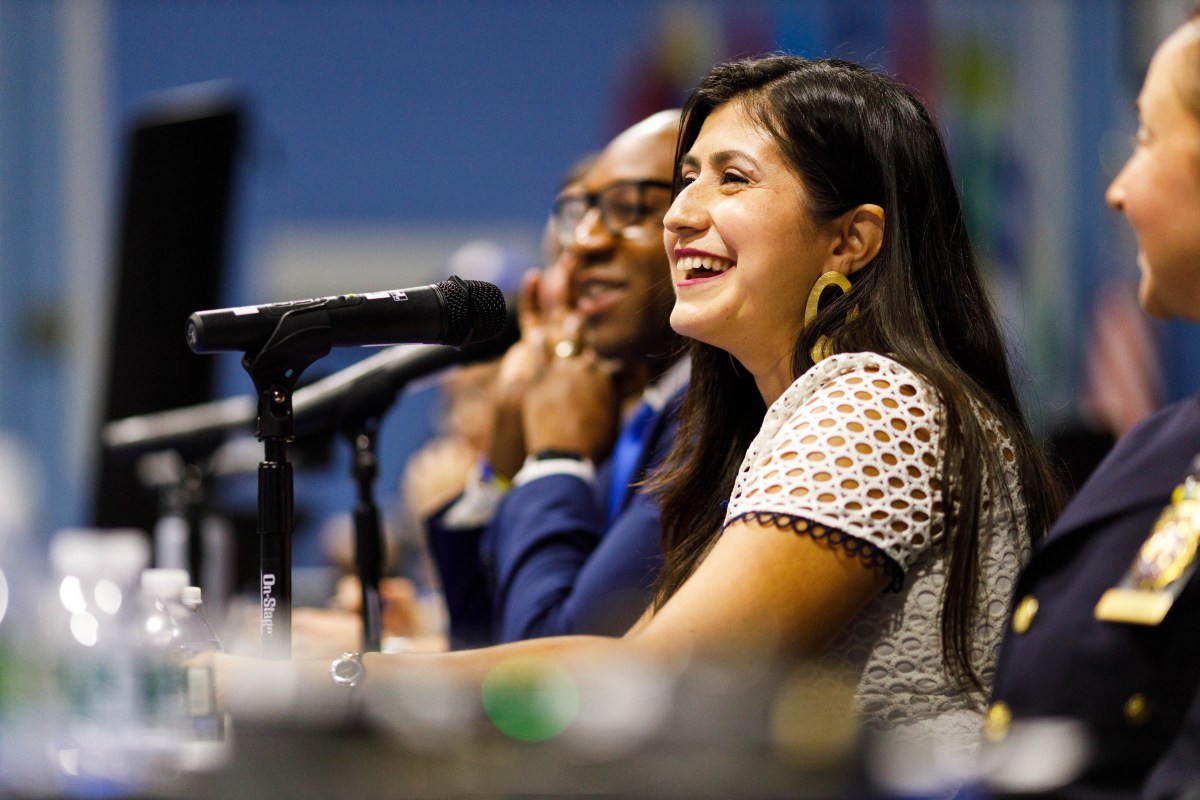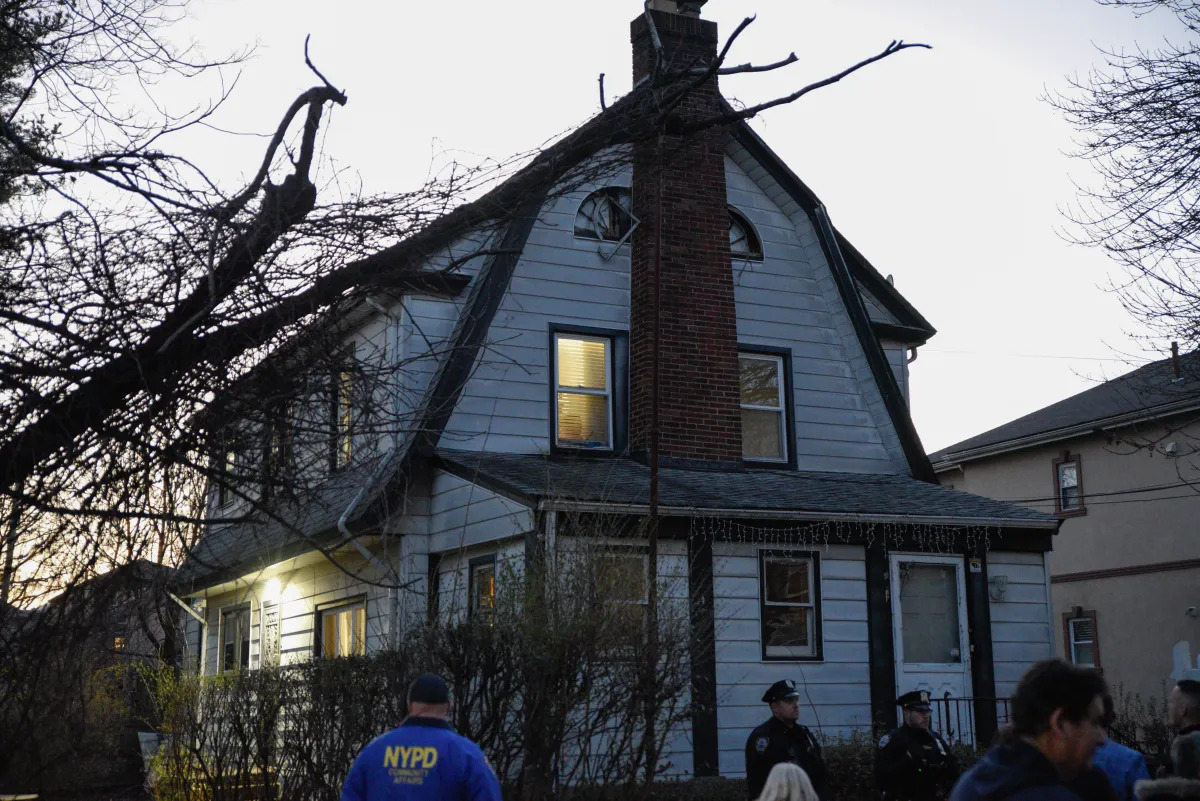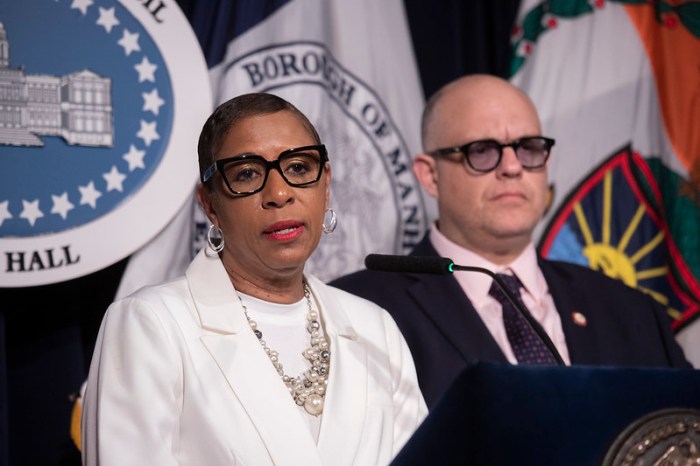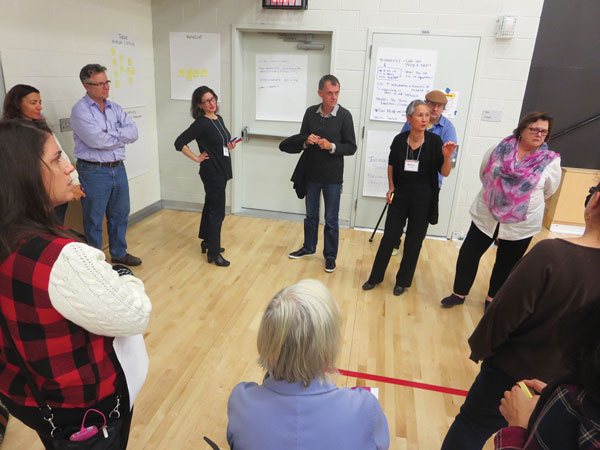
Shino Tanikawa, president of C.E.C. 2, making a point in one of the breakout groups toward the end of the three-hour meeting.
BY LINCOLN ANDERSON | If you could start a brand-new middle school, and could make it anything possible you wanted it to be, what would it be like?
That was the question that School District 2 parents began to grapple with at an “envisioning” meeting for the Village’s new 75 Morton St. school, held on Mon., Nov. 2, at the Clinton School for Writers and Artists, at 10 E. 15th St., near Union Square.
More than 100 parents attended the meeting, seated on movable chairs set out on the floor of the airy gym in the school’s new building. (Apparently, this is a “gymatorium,” which 75 Morton will also have — a gym that can also function as an auditorium and theater space.)
Heather Campbell, a member of the 75 Morton Community Alliance, opened the meeting with introductory remarks. What is known about 75 Morton is that it will be opening in fall 2017. It has no principal yet. The School Construction Authority says the middle school is being designed for 900 students, but local school activists counter that it should be a “right-sized” school, with only 600 to 700 students.
The meeting’s focus was what the “theme” of 75 Morton should be. Technically, it’s not required for the new school to have a particular theme or specialized focus. But the idea of a school theme and philosophy was used to drive the discussion about what attributes and core mission 75 Morton should have. For example, should the new Village-area middle school be laser-focused on academic excellence, or are there other qualities that local parents would prefer emphasized in their children’s education?
As became clear by the meeting’s end, most parents in attendance favored a middle school that would instill a “core value system” in their children, rather than an elite sort of “Stuyvesant Middle School.”
Bonnie Laboy, superintendent of School District 2, gave a general explanation of themed schools. There are “pure theme-based schools,” she said, giving the example of Ballet Tech, a fourth-to-eighth-grade district school where students are on a path to become ballet dancers. There is the Harbor School on Governors Island, where students study marine science. Yet, even theme-based schools have a larger liberal arts core, she noted, adding that it’s best for young people not to be pigeonholed too early into specific fields.
“Middle school should be a place for and of exploration for them,” Laboy said. “I hope that you keep this in mind.”
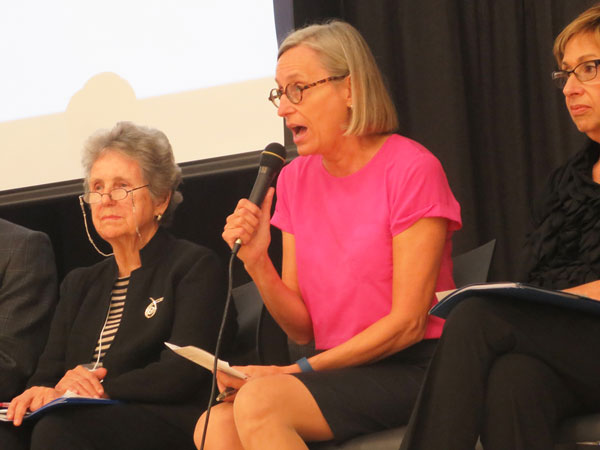
District 75 concerns
There were some parents of District 75 students in the audience who expressed concern that the new school will separate out these 100 special-needs students by giving them the building’s second floor, while the rest of the students will be on floors three through five. This will create two “separate entities,” these parents protested.
However, Gary Hecht, superintendent of District 75, responded, “It’s one school. It’s a one-school model.”
Unconvinced, a parent of a former special-needs student, said, “I find it’s a throwback to an earlier era. The idea that you would deliberately segregate them.”
Who chooses the principal? another parent in the audience asked. That answer was more clear-cut.
“I choose the principal, yes, that’s my responsibility,” Laboy said authoritatively, with a smile.
Next a panel of education experts took seats on the gymatorium’s stage, where they shared their thoughts and experiences about the process of forming a new middle school, and then growing it.
Like Laboy, Terri Ruyter, principal of the Battery Park City School, stressed the importance of adolescent students being able to explore different directions and try on different identities.
“Most students change their majors in college,” she noted.
Sports, music and science are also key parts of students’ school experience, as well as their general well-being, she said.
“When you put a basketball in a kid’s hands, they become a different person,” she noted. “Science classes take students’ minds in a different direction.”
She added that the middle school will naturally evolve.
“You’ll find that at Morton St., it will be a work in progress,” she explained.
Keeping a balance
Jonathan Levin, principal of the Clinton School for Writers and Artists, which is a themed school, said, for him, it’s a balancing act between staying true to the school’s core principles but also ensuring that the students get a balanced education.
“We have to remember that these are fifth graders,” he said, adding that, at this point, it’s often really the parents who are directing their young children into these specialized areas of study.
Like Ruyter, he said, “In the first few years, the school is going to be growing and changing. That’s why it’s important to keep the dialogue going.”
Ann Wiener, an education consultant who was the founding principal of a middle school, emphasized that students at this age are going through tremendous upheaval.
“Only 2-year-olds change as much as adolescents,” she noted.
Keen Berger, a former president of Community School Board 2 and an education professor, concurred.
“In middle school, students’ brains are zigzagging between the limbic system and the prefrontal cortex, where they are trying to figure it all out,” she said. “So I want to see a school with a lot of social interaction.”
Likewise, Leona Casella, a teacher, said, “At the end of the day, relationships are the most important thing in middle school. As Keen said, the brain is all over the place.”
Mark Alter, an educator and professor, said starting a new school is a tremendous opportunity, and that parents won’t go wrong if they just let the students do their thing.
“You’re in an incredible state now — kids learning,” he said. “Just don’t get in their way.”
Diversity, bilingual, tech…
A parent in the audience said it was important to her that the school be racially integrated, which she said would make her child both “a better person,” plus better equipped to deal with a diverse society. Another parent expressed her hope for a dual-language school.
Another school mom, Linda Ferrando, noted that many professionals today in fields like music and journalism have an inadequate understanding of digital technology and are “suffering” because of it. The school should make sure to instill tech skills in its students, she recommended.
Parents had a chance to offer further input as the audience was separated into four “breakout” groups for more discussion on a possible theme for the new school.
Holly Noto, a volunteer with 75MCA who helped run the meeting, urged the audience members to use Post-It pads and pens that were left under their chairs to jot down their “wants” for the school.
“Those Post-It notes under your chair are your voice,” she said. Giving an example, she said, “If we all write down that we want chocolate cupcakes, we’re gonna get ’em.”
Again, in the breakout groups, just as on the experts’ panel, concern about the young students’ well-being and development took precedence.
“I work in technology, but technology creates isolation,” offered one parent on the dual-edged nature of tech in the classroom.
Opined a father, “Since it’s a big school, diversity and collaboration could be the centerpiece.”
A woman in his group chimed in, “I went to a Quaker school. Their theme was caring, cooperation.”
As the parents gave their ideas, 75MCA members jotted them down on large pieces of white paper on the wall and also stuck the parents’ Post-Its with their written thoughts alongside them.
Connect to Google?
Another mom suggested that 75 Morton be an “art and technology” school and form relationships with the new Whitney Museum of American Art and Google, which are both in the neighborhood.
“I’m thinking about where the school is, what the context is,” she explained.
“We are near the Cherry Lane and the Atlantic Theater,” added another woman in her group, on the same page in terms of forming local arts connections.
However, one father pointed out, “We don’t have to have a theme. It could be the Greenwich Village School of Excellence.”
Campbell, though, who was co-moderating this breakout group, pointed out that a theme is useful “to give some guidance to the hire that’s going to be made,” referring to the school’s principal.
Also, Campbell added, “The theme is part of the sales pitch. We have to differentiate the school.”
However, the father — apparently hoping for an academically rigorous school — persisted.
“I keep coming back to the theme of excellence,” he said. “The Greenwich Village School of Excellence — isn’t that what every school wants to be?”
But the woman who had suggested an arts-and-technology-based school was concerned at the sound of that idea.
“I like the term ‘excellence,’ but I don’t really know what that means,” she said. “I hear ‘excellence,’ I think of a very academic idea. But there’s also excellence in emotional intelligence.”
Another woman sitting in the circle pitched in: “I’d like to support the idea of excellence in communication skills.”
Beyond academics
As the meeting, which lasted more than three hours, drew to a close, the moderators of the breakout groups each recapped their groups’ discussions.
“An academic theme, while wonderful, was a little too limiting for us,” Campbell reported of her group. “We want our kids to be good citizens, with a love of learning, social responsibility and inclusiveness.”
The moderator of group number two said their priorities included “being part of the community: The school should be accountable to the community and vice versa.”
A moderator for group number three reported, “The primary topic was inclusion over here.”
In group four, the moderator announced, “We didn’t like going as hardcore as Ballet Tech. There was talk of potentially being bilingual.”
Noto said she would collect all the input and give it to the Department of Education and Community Education Council District 2.
“And District 75!” called out a parent of a special-needs student in the audience.
Speaking afterward, Emily Hellstrom, said, “The school doesn’t have to have a theme. It’s really what the community wants. It could be anything that we envision. I think D.O.E. really wants to know what we have to say because D.O.E. wants buy-in. We’re going to get a top principal and top-level staff.”
Admissions for the school — whether it will be zoned or screened and so on — will admittedly be a “thorny” topic, as it always is for any school, Hellstrom said.
But, above all, she said, “This is a win-win for District 2 because it’s a badly needed school, and it’s going to be a great school.”
‘Not separate but equal’
As for the concerns about the District 75 students being on a separate floor, Campbell clarified, “It’s not separate but equal or relegated, but rather floors that are focused and take into consideration special needs, and then can meet those needs — creating classrooms tailored to the children in D75. The second floor is dedicated to D75 classrooms and the third-to-fifth floors are dedicated to general education classrooms. But the entire first, sixth and seventh, fourth-floor library, playground and potential green roof are shared by all students. There are all types of inclusion possibilities as well: core classes, electives courses, after-school classes, etc.”
Michael Markowitz, a former member of C.E.C. 2, told The Villager that he is pushing for 75 Morton to be named the Jane Jacobs School, after the famed late Village activist and urban planner.
Berger, who is a core member of 75MCA, reflected that she has found the process of community involvement in the startup of 75 Morton truly inspiring.
“I was president of the school board 20 years ago,” she said, “and this 75 Morton thing is amazing.”










